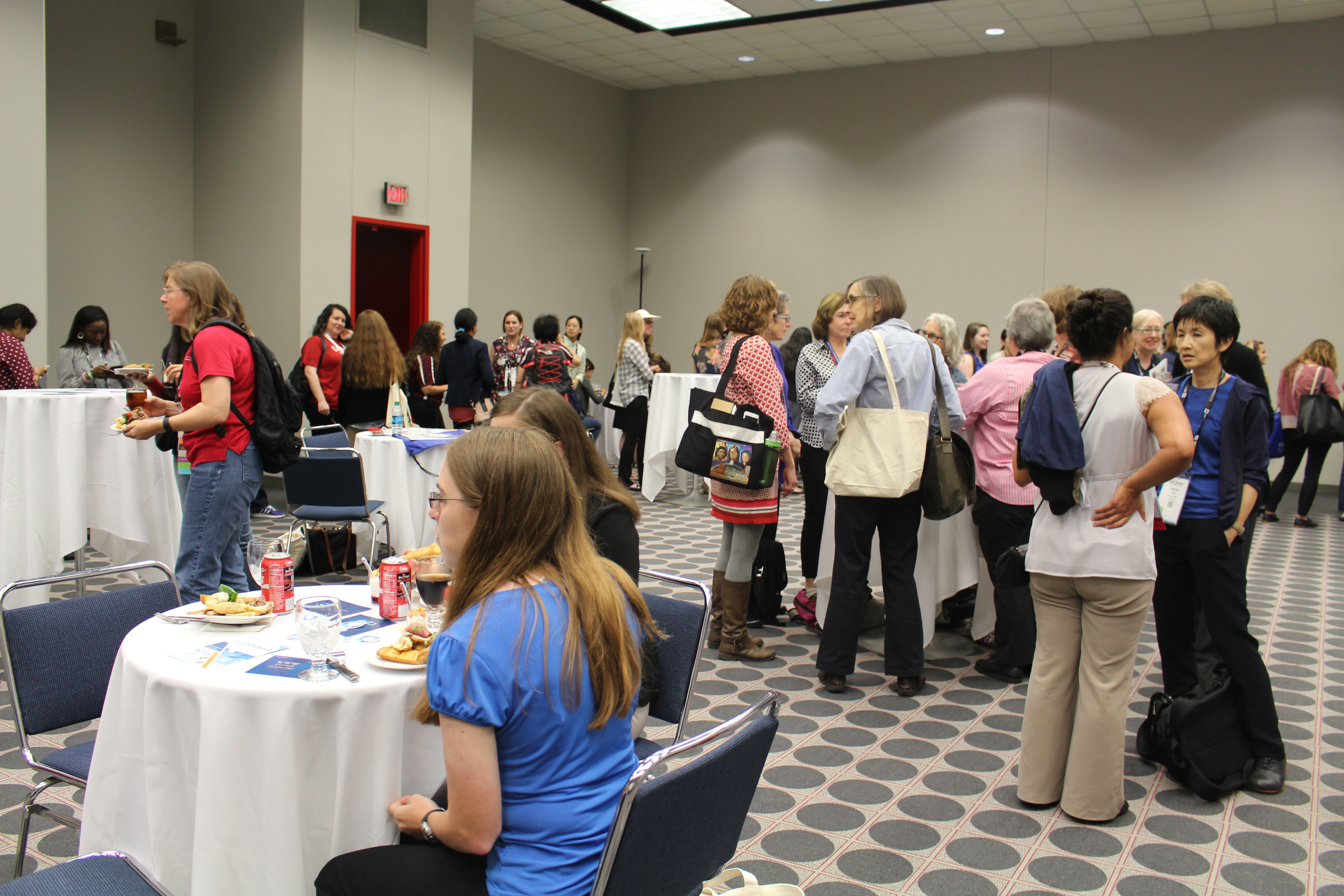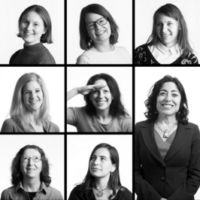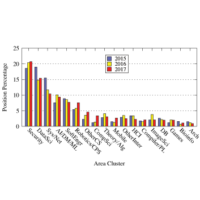Expanding the Pipeline: CRA-W Continues Research Mentoring at the 2016 Grace Hopper Celebration of Women in Computing
The 2016 Grace Hopper Celebration of Women in Computing (GHC) was held October 19-21, 2016, at the George R. Brown Convention Center in Houston, Texas and broke last year’s attendance record with over 15,000 participants this year. For the 8th year in a row, CRA-W presented career mentoring content for GHC attendees interested in research. CRA-W Board Member Tracy Camp (Colorado School of Mines) designed this year’s program, organizing the mentoring program into three tracks for early-career academic researchers, graduate students, and undergraduates. Brand new for 2016 was the CRA-W GHC Undergraduate Research Scholars Program, spearheaded by CRA-W Co-Chair Nancy Amato (Texas A&M University) and CRA-W Board Member Andrea Danyluk (Williams College), which provided funding for undergraduates to attend the conference, and guidance for finding and navigating the research content at GHC.
CRA-W’s mentoring tracks for early-career researchers and graduate students kicked off on Wednesday, October 19 with “Want to be a Bias Interruptor?” – an active session that discussed unconscious biases that exist in academic computing departments, techniques for becoming a “bias interruptor,” and included time to practice the skills learned. This session was a collaboration of CRA-W, ACM-W, and NCWIT, and was organized by Valerie Barr (Union College and ACM-W), Tracy Camp (Colorado School of Mines and CRA-W), and Lucy Sanders (NCWIT). The featured speakers were Latanya Sweeney (Harvard University) and Brad McLain (NCWIT).
CRA-W’s mentoring program on Thursday, October 20, focused primarily on early-career faculty, with talks on (1) Effective Teaching Tactics, presented by Valerie Barr (Union College) and Susan Rodger (Duke University), (2) Research/Funding Strategies for Faculty, by Andrea Danyluk (Williams College) and Deb Agarwal (Lawrence Berkeley Labs), (3) Preparing for Tenure and Promotion, presented by Julia Hirschberg (Columbia University) and Jodi Tims (Baldwin Wallace University), as well as (4) Gaining Recognition for Your Accomplishments in Academia, by Nancy Amato (Texas A&M University) and Ellen Walker (Hiram College). This track – essentially a workshop within the conference – was extremely popular, with many students attending multiple presentations.
The sessions on Friday, October 21, focused on students at all levels. CRA-W staffed ten tables in the Student Opportunity Lab (SOL) on six different topics: (1) How to Be Successful Post-Bachelor’s, (2) Is Graduate School for You?, (3) Masters or Ph.D.?, (4) How to Successfully Apply to Graduate School, (5) What is Computing Research? How Can Undergraduates Participate?, and (6) Research Careers: What Are The Options? How Do I Get There? The SOL was in a large convention center room, and had many tables with 1-2 mentors at each table leading discussions on different topics. Short 20-minute sessions allowed small groups of students to have interactive discussions with mentors at several different tables over the 3-hour SOL session. The CRA-W tables, which were primarily designed for undergraduates in the past, included plenty of content for graduate students as well as those contemplating going back to school. CRA-W Board Member Andrea Danyluk recruited 40 fabulous mentors, who generously volunteered their time to talk with students, answer questions, and provide advice.
For students looking for a larger group mentoring experience, CRA-W presented three talks on Friday, October 21, focused on building student success: (1) Building Your Academic Professional Network, presented by Sunita Chandrasekaran (University of Delaware) and Soha Hassoun (Tufts University), (2) The Graduate School Experience, presented by Laura Dillon (Michigan State University) and Katie Siek (Indiana University Bloomington), and (3) Finding Your Dream Job with a Ph.D., by Dilma Da Silva (Texas A&M University) and Rita Wouhaybi (Intel Labs).
This year CRA-W, with generous funding from the National Science Foundation, introduced an exciting new scholarship program for undergraduates with strong interest in computing research. The CRA-W GHC Research Scholars Program provided registration and travel funding for 65 students representing 53 different institutions to attend GHC for small group mentoring, interaction with other research-interested students, and participation in research-focused events. A “passport” provided Research Scholars with a roadmap for navigating research content at the conference. This roadmap included the ACM Student Research Competition, technical talks, CRA-W tables at the Student Opportunity Lab, CRA-W presentations and the student poster session, where several posters were presented by participants in the CRA-W Distributed Research Experience for Undergraduates (DREU) and Collaborative Research Experience for Undergraduates programs. Two special events – a networking reception for Research Scholars and CRA-W mentors, as well as a breakfast on the final day of the conference – served as book ends to the program. At these events, students met each other and later shared what they had learned.
 Details on the GHC 2016 version of the CRA-W workshops are available here: https://cra.org/cra-w/career-mentoring-workshops-at-grace-hopper/. CRA-W partners with the Anita Borg Institute in order to offer career advice to hundreds of GHC attendees, as well as to ensure they are aware of the other programs that CRA-W offers. CRA-W’s GHC 2016 programs would not have been possible without the additional support of 40 mentor volunteers, many of whom were current or former CRA-W board members.
Details on the GHC 2016 version of the CRA-W workshops are available here: https://cra.org/cra-w/career-mentoring-workshops-at-grace-hopper/. CRA-W partners with the Anita Borg Institute in order to offer career advice to hundreds of GHC attendees, as well as to ensure they are aware of the other programs that CRA-W offers. CRA-W’s GHC 2016 programs would not have been possible without the additional support of 40 mentor volunteers, many of whom were current or former CRA-W board members.
Energetic CRA staff members (Erik Russell, Melissa Borts, and Sandra Corbett) and several CRA-W board members ensured that the CRA-W booth at GHC 2016 was always fully staffed. The booth was busier than ever before, with staff answering questions and getting the word out about CRA-W’s programs.
And speaking of CRA-W programs, don’t miss these upcoming deadlines:
- Distributed Research Experience for Undergraduates for undergraduates from underrepresented groups: Applications due February 15, 2017.
- Borg Early Career Award: Nominations due February 15, 2017.
About the authors:
Andrea Danyluk is the Dennis A. Meenan ’54 Third Century Professor of Computer Science at Williams College. Her research is in Machine Learning, and she is also active in computer science education, having co-authored a Java textbook, among other projects. She is passionate about broadening participation in computing and is a member of CRA-W. For many years she co-directed the Collaborative Research Experience for Undergraduates program. She now coordinates mentoring events and workshops for undergraduates.
Tracy Camp is the Division Director and Professor of Computer Science in the Division of Computer Science at the Colorado School of Mines. Her current research interests include the credibility of ad hoc network simulation studies and the use of wireless sensor networks in geosystems. After three exhilarating years serving as Co-Chair of CRA-W, she now leads the organization of CRA-W content at the Grace Hopper Celebration.









